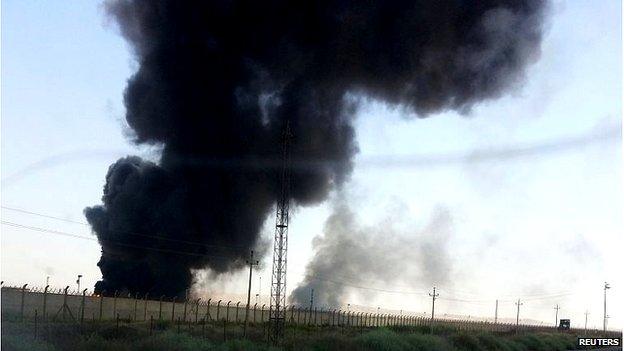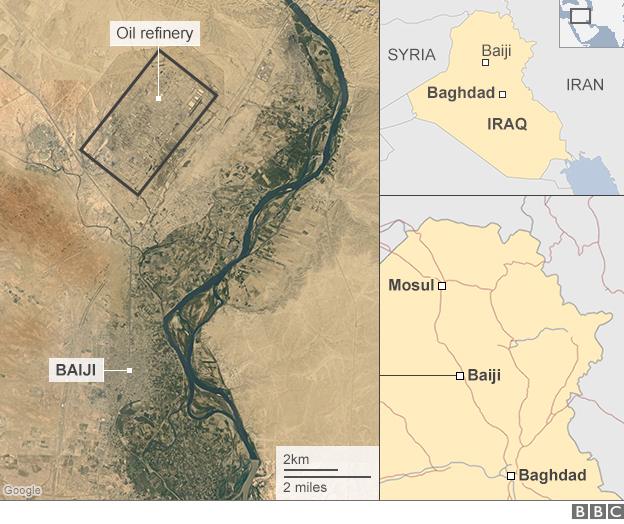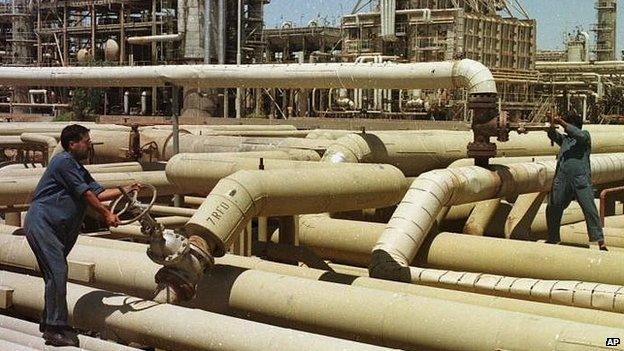How important is the battle for Iraq's Baiji oil refinery?
- Published

Baiji has repeatedly been a battleground between Iraqi forces and IS fighters
The struggle between Iraqi government forces and Shia militia against Islamic State (IS) for control of the country's largest oil refinery, Baiji, is at yet another critical moment.
Although it has changed hands several times in recent months, the current offensive by IS threatens once again to displace Iraqi troops and their allies.
The importance of retaking the nearby IS-held town of Baiji and relieving the refinery was stressed last month by the United States' most senior military officer, Gen Martin Dempsey, who said doing so would deprive IS of a major source of revenue.
Its capture is also seen as crucial for plans to attack IS in Mosul, owing to its position on the main road north to the city from Baghdad.
However, despite the emotion of the moment, the strategic value of this piece of territory is in actual fact mixed.
To the victor of Baiji go the spoils, according to the current narrative of the conflict in Iraq, but this conclusion is questionable given the effort required to take it combined with the equivocal gains.
Disruption not defeat
At the moment, about 200 Iraqi security personnel are besieged inside the sprawling 10-sq-mile (26-sq-km) refinery, where IS fighters might have taken over up to two-thirds, according to reports.
For either side, keeping control of the refinery will come at a cost.
To hold on to Baiji requires personnel and robust logistics support. Even worse for the Iraqis tactically, the fight to hold the refinery tends to favour IS.
As a battlefield it offers all of the complications of urban warfare micro-terrain which allow small, dispersed forces to fight and maintain a presence nearly indefinitely given the lesser demands of such a campaign.

It is also important to note that IS does not need to win so much as make it impossible for the Iraqis to do so. Such an objective relies upon disruption not defeat of the opponent and thus does not require large numbers of fighters or sophisticated battle plans.
A senior Iraqi army official has said only about 230 IS fighters are involved in the fight for the refinery. They are reported to have set fire to storage tanks and other parts of the refinery, making air strikes and air drops of provisions more difficult.
As well, in considering how the government forces could defend or retake it, the destruction of the refinery, which had been producing upwards of 175,000 barrels of oil a day until it was shut last summer, is a fraught outcome to be avoided.
This limits the military methods available, including US-led coalition air strikes, to defeat or displace IS.
Alternatively, despite its tangible importance to them, IS fighters will likely destroy the facility before losing it.
Isolated frontier
However, were the fight to go in its favour, for the foreseeable future IS will not benefit from the gains.
Neither will the group be able to rely upon it for fuel or revenue, two areas in which its reserves are limited and shrinking.

The refinery has been shut since IS launched its offensive in June 2014
Geographically, Baiji is part of the high-water mark of the IS eastern advance into Iraq. For that, however, it may also represent how the group has overreached and now suffer the burdens of supporting its gains.
Recent events support this. Having lost Tikrit in April and facing challenge in western Anbar province, the refinery becomes a relatively isolated frontier.
Moreover, the Baiji area's relevance to Mosul may be overstated. While it does lie astride the path to Mosul, on its own - minus oil and revenue production - it provides little of value to the defence of the IS "capital" in Iraq.
Cut off from support from the north or west, it is entirely possible that Baiji can be isolated and bypassed by Iraqi forces following a leapfrogging strategy rather than a straight-corridor approach.
Thus, although the oil revenues would benefit the Iraqi state, in the short-term the military costs well outweigh the need.
Unsustainable asset?
Turned on its head, Baiji can be reckoned as a strategic burden to IS.
The group faces real weaknesses in resources, logistics and manpower. Its income is fragile. It has an insurgent infrastructure to support its military campaigns. And at the end of the day it has a limited army with severe manpower constraints.
Were IS to take the Baiji refinery, the need to hold it would be difficult to avoid.
However, garrisons are neither easy nor cheap to maintain. Forcing IS to hold there and support the fixed position will cost the group without necessarily providing any real strategic benefits.
Baiji may look like an obstacle to Iraq and the coalition, but in fact it may be the metaphor of victory.
Jill S Russell is a military historian with an extensive background in defence and security affairs. Her submitted doctoral thesis for the War Studies Department at King's College London surveys the development of logistics in modern military practice and its influence on strategic culture. Follow her @jsargentr, external